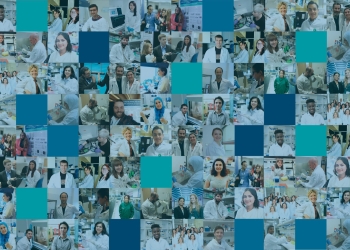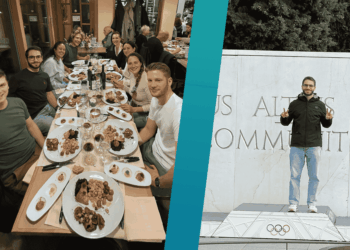When Katalin Karikó was forced to leave her position at the University of Pennsylvania for being “unsuccessful” in her work, she had no inkling that in 10 years’ time she’d be winning a Nobel prize. What she did know was that, despite what her faculty peers may have thought, she was making progress. She, alongside collaborator Drew Wisseman, was learning that RNA could be modified, making it more effective as a tool for gene therapy1.
But the story of Karikó and mRNA vaccines isn’t just about perseverance and self-belief. It’s about precision technology, refinement and the process of iteration. And why individualised neoantigen mRNA vaccines represent a fascinating advance in cancer research.
Initial studies over 30 years ago, showing first that mRNA could be transcribed in vitro, and then that mRNA-encoded antigens elicit immune responses2;3;4 marked the dawn of this new age of research. Gradually, work to modify the structure of the mRNA, improve delivery and purification methods enabled greater utility. Such as the incorporation of pseudouridine into mRNA, making vectors less immunogenic by shielding them from RNA sensors5. And the refinement of lipid droplet technology for delivery of mRNA, preventing degradation in vivo6.
Parallel to this work was the understanding that tumours produce non-self antigens, created by aberrant mutations, fusions and splicing. Two key findings from this work were 1) that neoantigens often aren’t shared between patients, but are specific to the tumour, and 2) that neoantigen-rich tumours respond better to immune checkpoint inhibitors (ICIs)7.
Personalised mRNA-based vaccines predominantly comprise modified, in vitro synthesized mRNA encoding between 10 and 30 tumour antigens. The antigens are presented on the surface of antigen-presenting cells by MHC molecules to activate anti-tumour immunity. Often, vaccines are administered alongside ICIs such as Pembrolizumab and Atezolizumab, to release the block tumour cells impose on immune signalling.
Within the last year, results of two trials employing mRNA-4157 (KEYNOTE603 and KEYNOTE942) have been published. These trials used an mRNA-based vaccine containing up to 34 patient-specific neoantigens, which, particularly when administered alongside Pembrolizumab, elicited strong T-cell responses8;9. In a 2023 study by Rojas et al, 8 of the 16 patients treated with Cevumeran, an mRNA vaccine containing up to 20 neoantigens, and Atezolizumab had strong neoantigen-specific T-cell responses10. Patients also showed increased interferon gamma signalling and improved rates of recurrence over 30 months.
The use of costly and labour-intensive whole-exome and RNA sequencing in these trials to identify neoantigens may limit clinical scalability in the future. Additionally, research moving forward should address why some patients respond to the vaccines and others don’t, even when combined with ICIs.
However, the combination of personalised mRNA vaccines and ICIs has been an area of impassioned research and represents a critical advance in cancer treatment. Though it is yet to be seen whether this Nobel prize-winning technology will prove it’s worth in the field of cancer research, continuation of the research efforts and more determined refinement will no doubt be fruitful.
Header image created by AI
About the Author:

Katie Begg has been announced as the second recipient of an EACR-Molecular Oncology Editorial Fellowship, funding that is awarded to enable a talented cancer researcher to gain knowledge and experience of scientific publishing through a 3-month placement with our affiliated journal, Molecular Oncology. She is a postdoctoral fellow in Jessica Downs’ lab at the Institute of Cancer Research in London. Katie has had a broad research career, studying topics within the fields of epigenetics, genome instability, development and cancer. After receiving an undergraduate degree from the University of Leeds and a Master’s degree from the University of Bristol, Katie obtained her PhD from King’s College London in 2021.
For her PhD, she investigated the targets of a microRNA associated with poor radiotherapy response in Head and Neck cancers, and their impact on DNA damage signalling. During this time, she became particularly focussed on the behaviour of one of these targets in response to ionizing radiation within a hypoxic environment, and subsequent effect on cancer survival.
Her current research focusses on SWI/SNF chromatin remodellers, which are frequently misregulated in cancer. Particularly, she studies how loss of SWI/SNF subunits can alter immune signalling and the splicing landscape within the context of genome instability, as well as response to therapies including ionizing radiation.
A passionate science communicator, Katie was a national finalist in the 2018 Three Minute Thesis competition and is the co-ordinator for the ICR’s Pint of Science festival.
References
- Katalin Kariko interview, www.nobelprize.org/prizes/medicine/2023/kariko/interview/. Accessed 7/11/24
- Wolff J. A. et al. Direct gene transfer into mouse muscle in vivo. Science. 1990
- Martinon F et al. Induction of virus-specific cytotoxic T lymphocytes in vivo by liposome-entrapped mRNA. Eur. J. Immunol. 1993
- Boczkowski D et al. Dendritic cells pulsed with RNA are potent antigen-presenting cells in vitro and in vivo. J. Exp. Med. 1996
- Kariko K et al. Incorporation of pseudouridine into mRNA yields superior nonimmunogenic vector with increased translational capacity and biological stability. Mol Ther. 2008
- Pardi N et al. Expression kinetics of nucleoside-modified mRNA delivered in lipid nanoparticles to mice by various routes. J Control Release. 2017
- McGranahan N et al. Clonal neoantigens elicit T cell immunoreactivity and sensitivity to immune checkpoint blockade. Science. 2016
- Weber J S et al. Individualised neoantigen therapy mRNA-4157 (V940) plus pembrolizumab versus
pembrolizumab monotherapy in resected melanoma (KEYNOTE-942): a randomised, phase 2b study. The Lancet. 2024 - Gainor J F et al. T-cell Responses to Individualized Neoantigen Therapy mRNA-4157 (V940) Alone or in Combination with Pembrolizumab in the Phase 1 KEYNOTE-603 Study. Cancer Discovery. 2024
- Rojas L et al, nature Personalized RNA neoantigen vaccines stimulate T cells in pancreatic cancer. Nature. 2023








